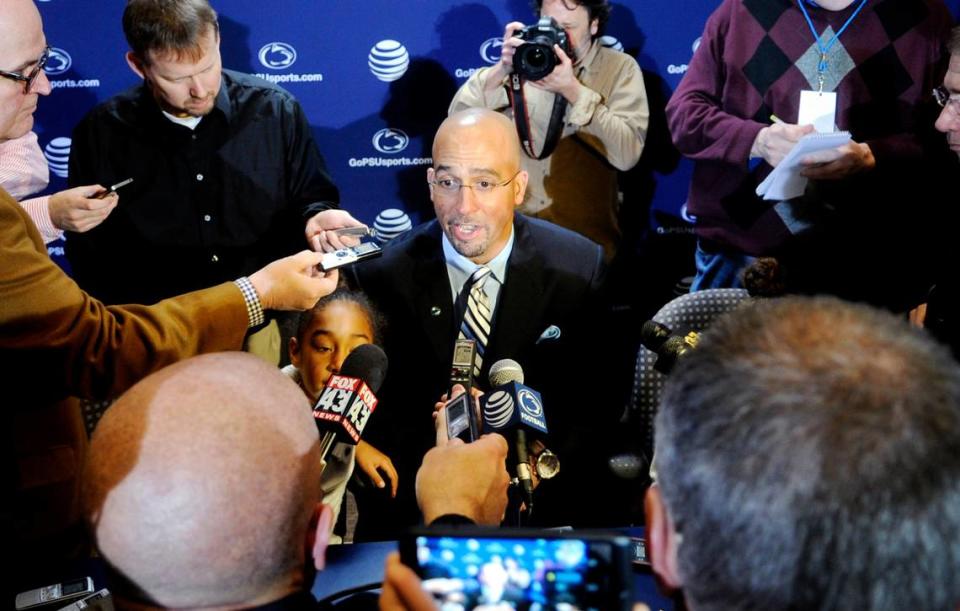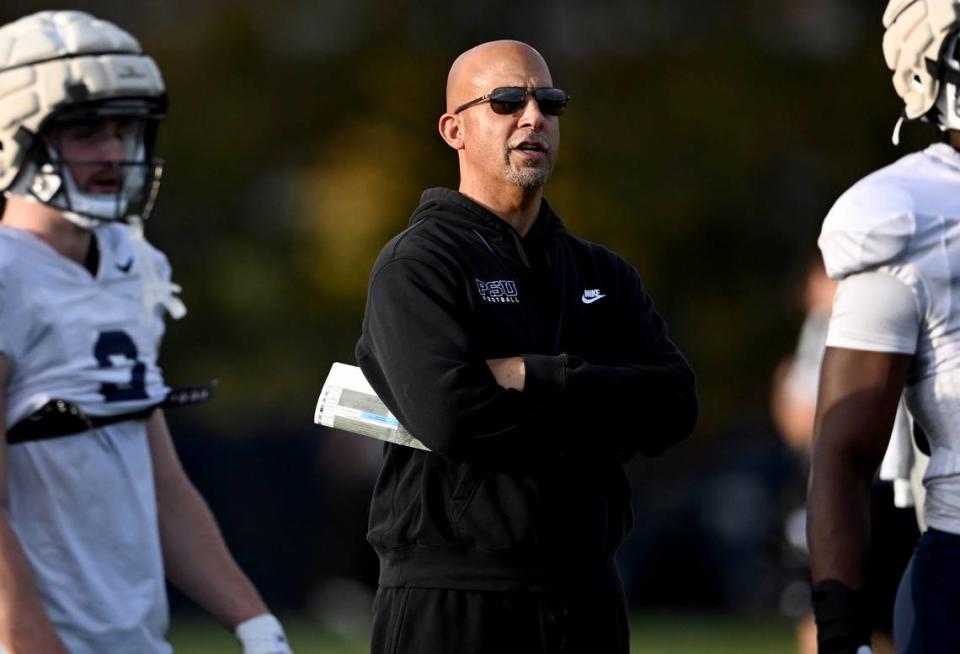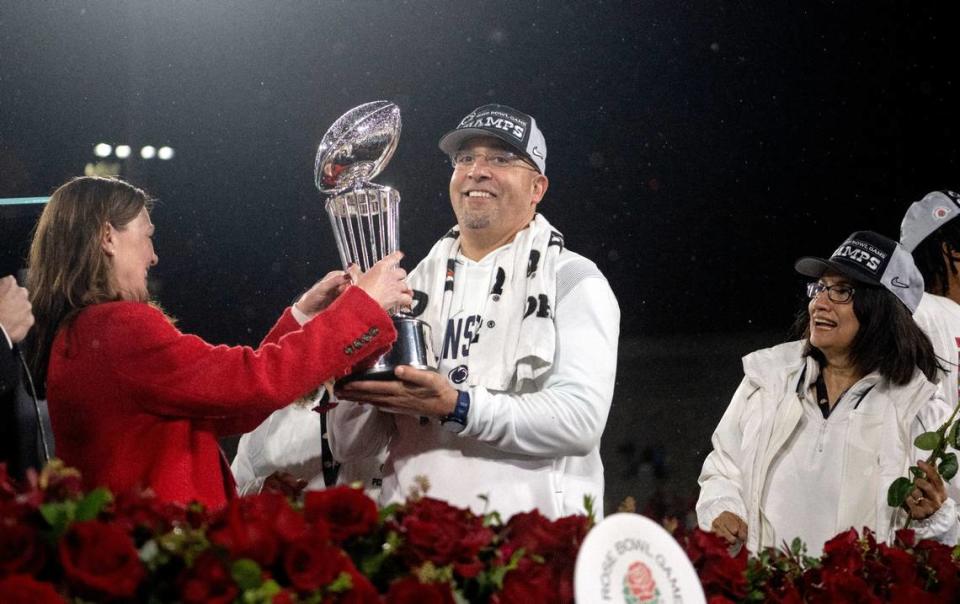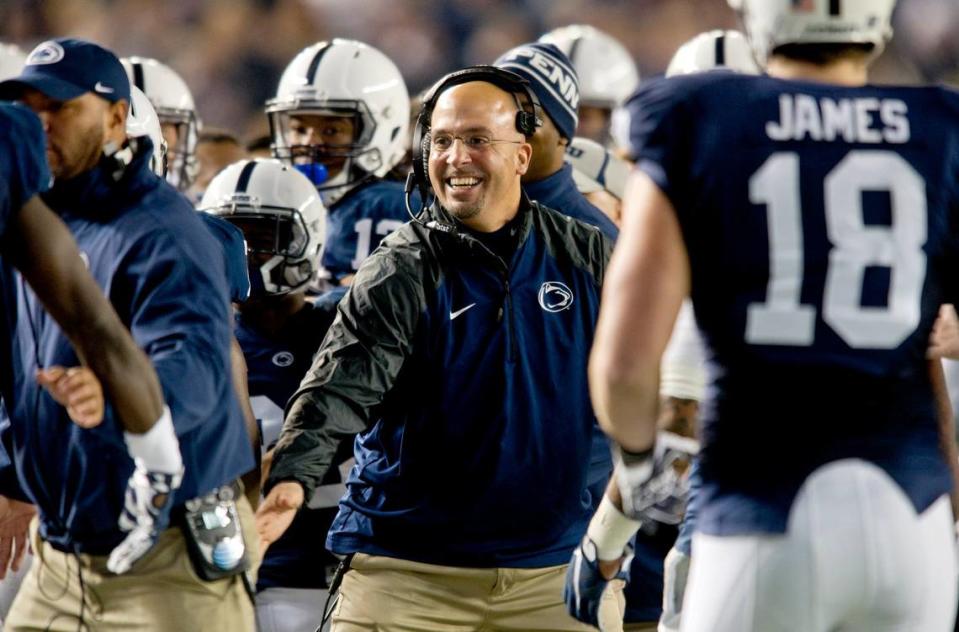10 years at Penn State: Football coach James Franklin on battles fought, what’s ahead
James Franklin leaned back in his seat as he pondered the question. Was he as happy as he anticipated being 10 years into his Penn State career?
He sat in a makeshift office two floors lower in the Lasch Football Building than his office of the past decade, due to a construction project in the facility. But he wasn’t out of place. He sat comfortably at a table, with jerseys of his former players around the temporary space.
After a breath, he answered.
“Yeah,” he said, looking up as if he were considering the entirety of the last 10 years in a few brief moments.
“I think what happens though, with coaches and just people sometimes the older you get, if you’re not careful the wins at a place like Penn State sometimes become just like an expectation,” Franklin told the Centre Daily Times. “And the losses can be really, really challenging and tough on the fan base, on everybody — the players, the coaches. I just really work hard at trying not to be that guy. But it’s hard not to.”
Franklin now sits comfortably atop a program that he helped rebuild and place within the top 15 in the country routinely — with a contract that keeps him securely in his seat as long as he sees fit and a decade’s worth of information to help him lead it into the future.

Rebuilding a program
Happy as he hoped does not mean Franklin doesn’t wish he knew more coming into the situation he did when he was hired on Jan. 11, 2014.
He left a Vanderbilt program he rebuilt and entered a program under NCAA sanctions — something he says he now tells people not to do because the expectations of patience are never fulfilled. Following the Jerry Sandusky scandal, the Nittany Lions were levied with a four-year postseason ban and scholarship reductions that were set to lower the number of players the program could take in a year from 25 to 15 (beginning in 2013) and the total number allowable scholarships given out on the roster from 85 to 65 (beginning in 2014).
“I knew where I was coming, I knew what I was following, but I didn’t know a ton of the details about some of the severity of the rules that were in place that weren’t really public that made the job a lot harder than I think people realize,” he said.
Franklin’s program faced those sanctions his first offseason as head coach, but they were soon rolled back in September 2014. However, some of the damage had already been done.
“When everything happened here, obviously there was an emotional challenge,” he said. “But it was a pretty darn good roster. Then you’re not able to recruit at the same level because of what happened here for a couple years. Then you come and the scholarship numbers are down, the last couple years you haven’t recruited at the same level. I think we had some real high level commits that people focus on but the entire class and the depth of the recruiting was different.”
The team had to make up for those issues, and do it quickly. New Penn State offensive coordinator Andy Kotelnicki said Franklin turning the program around as fast as he did earned him more credit than he received.
“He does not nearly get enough credit for as consistently good as Penn State has been,” Kotelnicki told the CDT. “Doesn’t get nearly enough credit. It’s as much of a rebuild, a turnaround, as there ever was in the country. And to do it consistently in the league that they play in? That’s incredibly hard. I said that before I started working here, but now that I’ve observed it? It’s damn impressive.”

Battles fought and won
While the sanctions presented a battle in their own right, there were other issues Franklin felt he had to deal with in order to put the program in a better position. Looking back at those battles — ones to make football more of a priority at the university, especially when it comes to infrastructure in the fast-changing world of college athletics — he sees that it was necessary to be willing to pick those fights at the beginning of his tenure.
“I just think about, it’s interesting like, I (have) much more thick skin now,” Franklin said. “But in some ways that thin skin back then and that emotional energy it created to fight every battle and everything and everyone which was very similar to Vanderbilt, in terms of the battles we had to fight to get that thing going, and then the battles that we had to fight here to make sure football was put in position that it had a chance to be successful and competitive at a high level for a long time, in some ways that thin skin as I was younger was important for fuel.”
Despite those fights and the team only going 14-12 over the first two seasons, he was able to hang on to his job and a decade later is at the helm of a program that is in a much healthier place. He has an athletic director in Pat Kraft who is aligned with his goal of winning at the highest level, and has seen an increase in resources — with the ongoing construction at Lasch, the $700 million renovation of Beaver Stadium and the team’s state-of-the-art weight room serving as examples — even if he continues to fight for more.

A watershed moment
But none of that would have happened without the turning point that came in that third year when the Nittany Lions took off and reached heights they haven’t attained since.
To get the win over Ohio State and Big Ten title in 2016, Franklin’s staff first had to handle the tumultuous beginning to the season that saw the team start 2-2, one that included chanting for him to be fired and booing just before the team began its run of success.
“One of the most important times and periods was that year three when it was our first year off of sanctions,” Franklin said. “It’s year three and we’d lost a couple games. I think people have heard me talk about the stadium and hearing the stadium and coming out of the Minnesota halftime at that game ... but people talk about how, in this building, you didn’t feel that or see that. We stuck to the plan, kept our poise, kept our composure, which allowed us to go on that nine game run. Although there was a lot of noise, the kids didn’t feel that, the staff didn’t feel that.”

That season marked a high point for the Nittany Lions. They’re still in search of their first College Football Playoff berth and now are facing heightened expectations to do so as it expands to 12 teams for the first time this season.
The difficulty in doing so only increases with an expanded Big Ten that now has Oregon, Washington, USC and UCLA.
Penn State will take on a difficult schedule, in part because of the expansion, and will do it with new defensive and offensive coordinators in arguably the most important year of the James Franklin Era. Yet, those coordinators are more likely to be the cause of the Nittany Lions’ success rather than the reason for their failure.
Kotelnicki joins after helping Lance Leipold turn Kansas into a legitimate threat in the Big 12 after it was a bottom feeder and had a strong offer from the Jayhawks to remain with the program and continue with Leipold. Defensive coordinator Tom Allen spent seven years as Indiana’s head coach with every opportunity to take time off after receiving a hefty buyout. Instead he chose Penn State and the opportunity that lies ahead.
Both coordinators advocated for what Franklin has built at Penn State and said it was part of the reason they saw it as a fit for them.
“It was a pretty big decision,” Allen told the CDT. “You get to this stage of your life and you kind of have a different perspective on things. You just want to make sure you’re with good people. ... You want to work for a person you really believe in.”
Allen and Kotelnicki have accepted the task at hand and will join Franklin in his fight for the elusive playoff berth. Theoretically, no program in the country should benefit more from playoff expansion than Penn State. The Nittany Lions are routinely inside the top 12 but outside the top four when the regular season comes to an end.
The window is wide open — Allen and Kotelnicki are two of the better coordinators in the country and are being compensated like it with salaries eclipsing $1.5 million. Franklin has an elite talent at quarterback in second-year starter Drew Allar and a defense that should once again be among the best in the country.
Ten years into his tenure, Franklin arguably has as much talent as he did when he won the Big Ten title and as much on the line as he has in any years in the previous decade.
But he’s as comfortable in his skin as he’s ever been — and ready to lead the Nittany Lions into the future armed with the resources and alignment he spent the first 10 years chasing.


 Yahoo Sports
Yahoo Sports 
